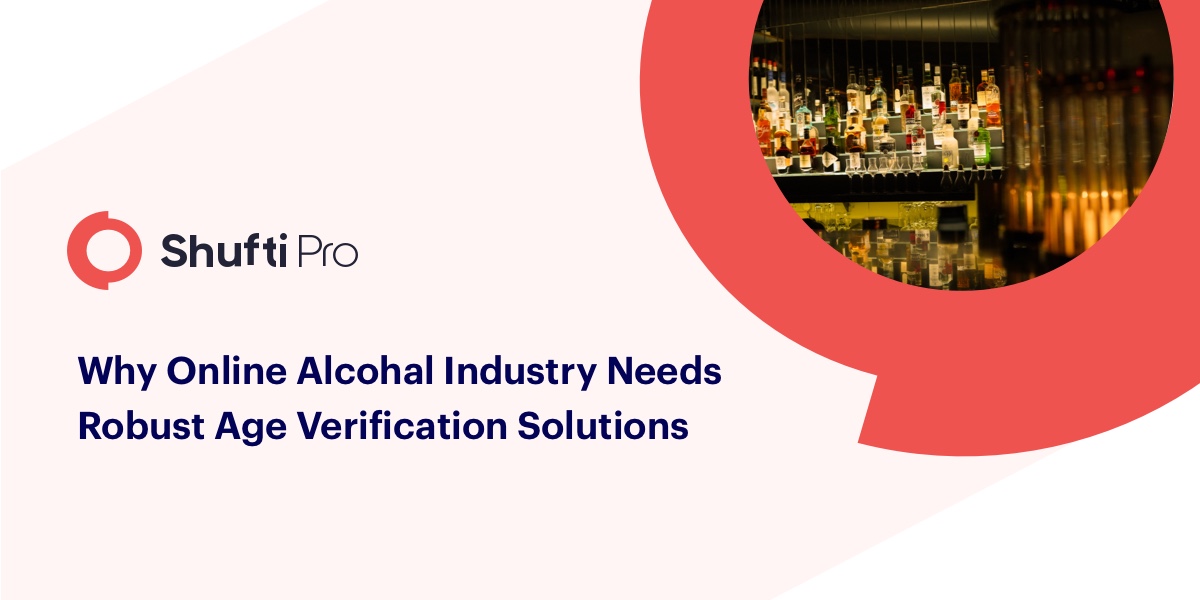Why online alcohol industry needs robust age verification solutions?

“Can I see some ID?” The question brick and mortar booze stores ask or at least should ask to verify that the buyer is of legal age. These ID check laws are stringent in almost every jurisdiction. For instance, selling age-restricted products to minors is a punishable crime with a penalty of up to 20,000 pounds, as well as, causing significant reputational damage to the owner. Retailers responded by placing age verification checks at checkout.
However, with increasing sales and purchases happening over the internet, how these strict age checks should be carried out? This is becoming a challenging obstacle for online retailers of liquor products. It’s quite obvious that regulations apply to the sale of liquor both online and offline. But the problem for online retailers is arguably greater as the customers could hide their identity behind the anonymity that internet offers.
Even though there has been a considerable growth of age checking in the offline environment, which has contributed to a notable restriction in the illegal and underage sales of alcohol, it is becoming clear that online alcohol sales are a potential area of vulnerability for the retail sector. The dilemma is that most of these online sellers didn’t implant verification checks. Some of the major retailers do have some safeguarding restraints but the digital world is enormous and borderless. The current checks aren’t enough and more needs to be done by all retailers to ensure that underage alcohol sale is restricted.
What should the retailers do?
Online retailers need to make sure that they are not selling age-restricted products to the people under minimum legal age. The minimum age requirements are different in every jurisdiction, however, the online retailers should follow the most widely used minimum age requirement all over the world.
This means the retailers should set up effective age verification systems capable of identifying and verifying the age of customers to ensure they are above the legal age to purchase alcohol. When accessing which systems or checks could be more suitable, businesses should consider all legal requirements and exercise due diligence to avoid committing an offence. These legal requirements are not only a retailer’s defence in consumer protection regulations but they are also an ethical duty of the retailer.
These systems should be regularly observed and updated to identify any issues or to keep pace with the advancement in technology. Ordinarily speaking, there is no definite answer to what constitutes taking all feasible anticipations and exercise all due diligence possible.
Conventional age authentication checks unlikely to satisfy due diligence
Many online retail stores place simple checks and transfer the responsibility of verification to their customers. The simple age confirmation checkboxes are the most common type of restraints set up on the websites. Here are some of the checks that are, unfortunately, not enough to verify the age of purchasers.
- Relying on the customers to confirm their age
- Using simple disclaimers to make an assumption
- Using an accept statement for the users to confirm that they have read all the terms and conditions and are eligible to purchase their product.
- Accepting payments through credit card without verification that the card belongs to the person making purchases.
- Placing tick boxes to ask customers to confirm that they are of legal age
More convincing age verification checks
Age verification in the rapid pace digital world is a challenging and cumbersome task for both customers and businesses alike. Here are some of the possible precautions that retailers could implement to comply with age verification regulations.
Age verification on delivery
One simple age verification check could be that retailers rely on delivery drivers to request the age proof at the time of delivery. However, relying on the third party courier delivery services may not be a proper way as the third party could deny the responsibility for age verification.
Collect in-store policy
Another scenario where businesses could perform stringent age verification is by introducing the collect in-store policy. This strategy may work for some of the retailers having both online and street presence but for businesses offering products online only this strategy will not work.
Online age verification services
In this tech-savvy environment, online age verification solutions have become more convenient. With these solutions in place, businesses can now implement multiple layers of checks to verify the age of the customer.
Online age verification is a secure way to verify and validate the age of customers making purchases online. Using government-issued identity documents to verify the age of customers, both businesses and customers can help build a safer online market place for age-restricted products such as alcohol. By using AI-based identity verification solutions, businesses can verify the identity of a user more securely and in real-time without extra delays. This not only serves as a stringent verification check but also enhances the customer experience. Without interrupting the customer journey businesses could comply with all regulatory requirements around age-restricted products.
With increasing legal and ethical implications, it is necessary for businesses to employ a more technologically advanced age verification solution that serves multiple purposes at the same time. AI-based online identity verification solutions could help online alcohol retailers to restrict under-age users in real-time without creating obstacles for legitimate customers.

 Explore Now
Explore Now













